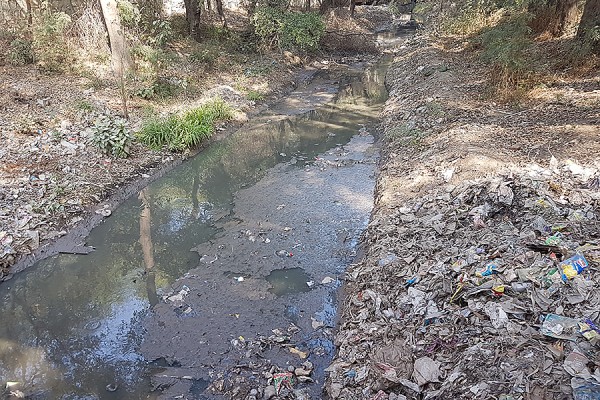 This open drain discharges into Sonia Vihar Lake, which feeds a source of Delhi’s drinking water.
This open drain discharges into Sonia Vihar Lake, which feeds a source of Delhi’s drinking water.
A UWindsor engineering professor is leading the way on an industry-academia collaboration that aims to improve drinking water quality in the capital of India.
Rajesh Seth has obtained funding through the India-Canada Centre for Innovative Multidisciplinary Partnerships to Accelerate Community Transformation and Sustainability (IC-IMPACTS) — a Canadian Network of Centres of Excellence dedicated to the development of research collaborations between Canada and India.
The joint project with researchers from the Council of Scientific and Industrial Research – National Environmental Engineering Research Institute in India aims to improve sewage-contaminated lake water quality through aeration and floating wetland plants. Dylan Verburg, a master’s candidate in environmental studying under Dr. Seth, will spend the fall semester in India collecting samples and data from Sonia Vihar Lake, a small polluted water pond which discharges into the Yamuna river, a source of Delhi’s drinking water.
“One of most effective ways to improve water quality is using organisms to break down pollution,” Seth said. “Biological treatment is faster when dissolved oxygen is in the water. So, if we want to improve the rate of treatment, one of the ways to do it — and we use it quite extensively in waste water treatment in North America — is to find an efficient way to replenish the dissolved oxygen that is quickly consumed.”
Seth has teamed with Canadianpond.ca Products, a Quebec company that designs and manufactures a linear aeration system optimized for efficient oxygen transfer into polluted water. This system doesn’t require extensive infrastructure support and can be easily adapted to work directly in lakes and ponds. Canadianpond.ca is providing the equipment, design, and support as an in-kind contribution in addition to $40,000 provided through the IC-IMPACTS Innovative Technologies Demonstration Initiative.
UWindsor student participation in the project is being supported in part by the Canadian Queen Elizabeth II Diamond Jubilee Scholarships. Seth said another UWindsor student will travel to India in the winter semester to continue Verburg’s research.
“It is expected that the capital and operating costs as well as the carbon footprint of this initiative will be more cost-effective and ecologically attractive compared to conventional wastewater treatment, which would require collection and treatment infrastructure that is too costly and time consuming to implement,” Seth said.
He is hoping to further his collaboration with the Indian institute beyond the pilot project to help deal with large-scale pollution of water resources in that country.
